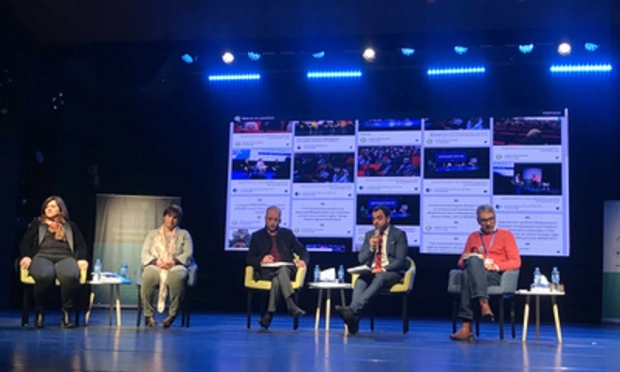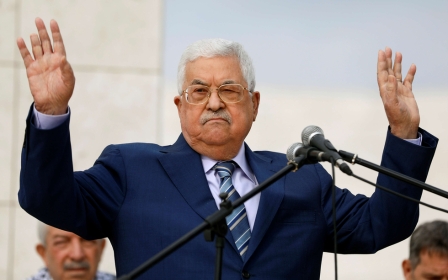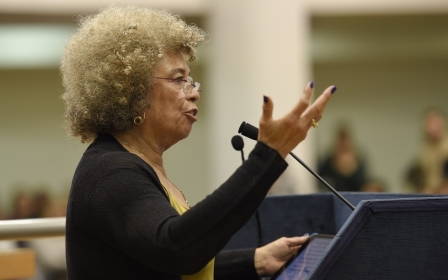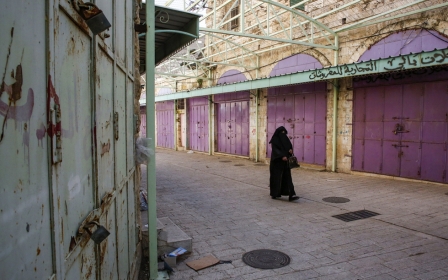Palestinian Authority comes under fire for censorship at digital activism forum
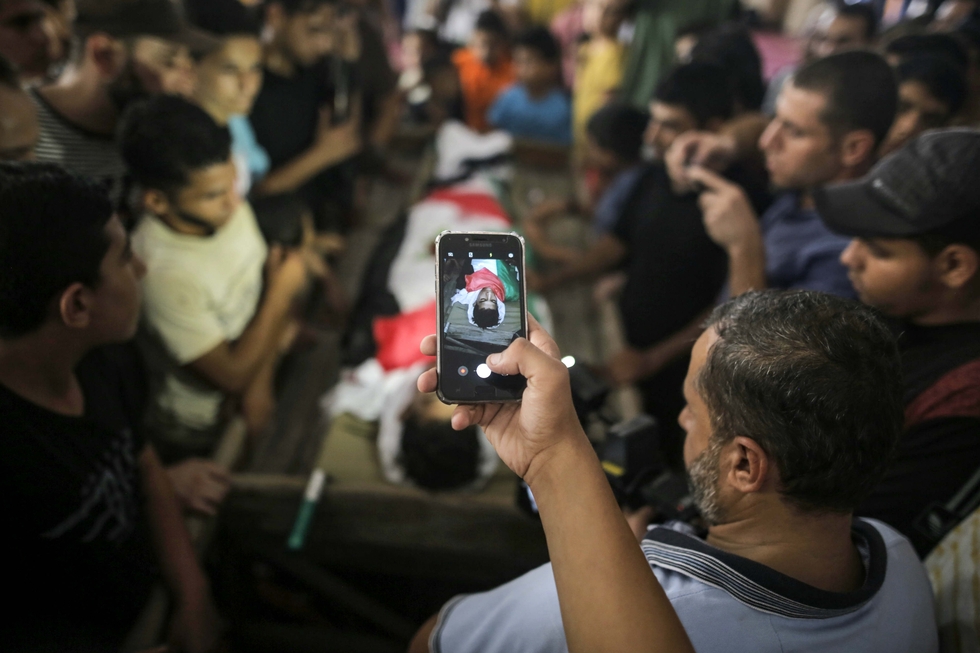
RAMALLAH, occupied West Bank – In the Ramallah municipality’s Baladi theatre hall, heated discussions unfolded on Wednesday surrounding Palestinian rights in the digital realm and the role of various authorities in restricting freedom of expression.
The dialogue took place at the launch of the Palestine Digital Activism Forum, held for the third year in a row.
The conference provides a platform for open debate between activists, politicians, experts and members of the public about digital rights, security, surveillance and how to overcome governmental control.
Over the first day of the event, attendees spoke with representatives from Human Rights Watch, the Addameer prisoner rights group, Amnesty International, and Palestinian members of the Israeli parliament, as well as international experts from the fields of digital security and monitoring.
Alaa Tamimi, a representative from the Palestinian attorney-general’s office, was grilled by fellow panellists and audience members after he said laws were in place to protect free speech, and that the Palestinian Authority’s (PA) arrests of critics was not in any way systematic.
“What you articulated was very ideal, but the gap between PA laws and what is implemented on the ground could not be wider,” one woman responded to his remarks.
In 2017, the PA passed a sweeping cybercrime law that rights groups and activists said was being used to silence online dissent and arrest critics.
Though the legislation was amended after a widespread outcry, the new law continues to contain ambiguous clauses that grant the government broad power to collect and monitor data about individuals, and to block websites.
The PA also continues to arrest and interrogate individuals on the basis of their social media posts.
“Is the PA really convinced that there is freedom of speech here?” one person asked Tamimi.
“Why are there 67 websites that are blocked off by the Palestinian Authority?” another questioned.
‘Facts don’t lie’
The event is organised by 7amleh, the Haifa-based Arab Centre for Social Media Advancement. The group provides social media training for Palestinian activists in Israel, Gaza and the West Bank.
It also carries out research and publishes detailed reports against freedom of expression, while pressuring companies like Facebook and Google to refrain from assisting in the oppression of Palestinians by Israel.
When panellist Sahar Francis from Addameer brought up the arrest of well-known Palestinian journalist, Jihad Barakat, after he filmed PA Prime Minister Rami Hamdallah’s motorcade passing an Israeli military checkpoint, Tamimi insisted that Barakat was released after 24 hours.
“The detention of any individual, as it pertains to the PA security forces or police, only lasts for 24 hours if there are no official charges made against the accused,” said Tamimi.
“Barakat was released after 24 hours. I was in charge of monitoring his file,” he continued, before the crowd laughed and Barakat, who was in the audience, jumped in to say he was actually detained for four days.
And when panellist Omar Shakir, the Israel-Palestine director for Human Rights Watch (HRW), said there is a systematic practice in which both the PA and Hamas authorities in Gaza “routinely arrest peaceful critics and opponents,” Tamimi responded by denying it was systematic in any way.
“Facts don’t lie,” responded Shakir, citing a recent report by HRW in which the group published findings from interviews with close to 150 witnesses, former detainees, their relatives, NGOs, medical reports and court documents.
“The purpose is no doubt to intimidate and stifle people. Palestinians are stuck between authorities intolerant of dissent,” added Shakir.
Israel’s arrests of Palestinians
Palestinian members of the Israeli parliament, Niveen Abu Rahmon, and Francis of Addameer both spoke about Israel’s role in arresting and charging Palestinians across Israel and in the occupied Palestinian territories over social media posts.
According to 7amleh, Israeli forces arrested more than 300 Palestinians from the West Bank and East Jerusalem over online content in 2017.
“There is continuous ongoing illegal Israeli practices suffocating Palestinian expression,” said Abu Rahmon.
Discussing Israel’s cyber department, which works with tech companies like Facebook to monitor and collect information about thousands of Palestinian social media users, Rahmon said that in 2017 “Israel requested that 12,000 posts be removed”.
There is continuous ongoing illegal Israeli practices suffocating Palestinian expression
- Niveen Abu Rahmon, member of Israeli parliament
“This department is illegal and imposes illegal monitoring,” continued Abu Rahmon.
The Israeli cyber unit reported that 85 percent of Israeli government requests to “remove content deemed harmful or dangerous” from social media companies, including Facebook and Twitter, were accepted in 2017.
While the conference was previously confined to Ramallah, this year it will for the first time take place across historic Palestine, including the cities of Gaza, Haifa, Jerusalem, Bethlehem and Nablus, as well as Taybeh town.
The second and third days will consist of 14 workshops and training sessions on topics such as mobile journalism, online gender-based violence and managing NGO campaigns.
Last year, representatives from Facebook and Google attended. They faced a flurry of questions from Palestinians in the audience about their work with the Israeli government in censoring Palestinian social media content.
This year, the media corporations cited technical reasons for not being able to attend.
New MEE newsletter: Jerusalem Dispatch
Sign up to get the latest insights and analysis on Israel-Palestine, alongside Turkey Unpacked and other MEE newsletters
Middle East Eye delivers independent and unrivalled coverage and analysis of the Middle East, North Africa and beyond. To learn more about republishing this content and the associated fees, please fill out this form. More about MEE can be found here.


